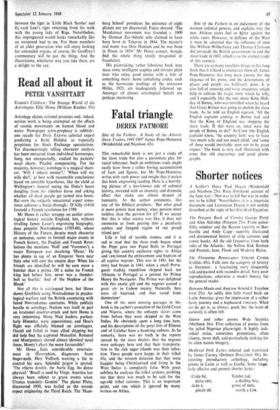Sins of the Fathers: A Study of the Atlantic Slave
Traders 1441-1807 James Pope-Hennessy (Weidenfeld and Nicolson 42s)
Fatal triangle
DEREK PATMORE
This remarkable book is not just a study of the slave trade but also a passionate plea for racial tolerance. Such an ambitious study might easily have been a rather boring accumulation of facts and figures, but Mr Pope-Hennessy writes with such power and insight that it makes this book engrossing reading. Here is a horrify- ing picture of a less-known side of colonial history, revealed with an intensity and dramatic effect that make one almost despair of humanity. As the author comments, like one of the Biblical prophets: 'But what goad is more potent than money, what passion more ruthless than the passion for it? If we accept that this is what society was like, it does not exonerate us from peering into a peculiarly sunless and fungoid region of our proud island past.'
Life is full of terrible ironies, and it is sad to read that the slave trade began when the Pope gave two Papal Bulls to Portugal giving this country exclusive rights to Africa and sanctioned the enslavement and baptism of all captive negroes. This was in 1481, but the story had begun in 1441, when a small Portu- guese trading expedition shipped back ten Africans to Portugal as a present for Prince Henry the Navigator. The Prince was delighted with this exotic gift and the negroes caused a great stir in Lisbon society. Naturally they were all baptised, and thus saved from damnation!
One of the most moving passages in this book is the author's evocation of the Gold Coast and Nigeria, where the unhappy slaves came from before they were shipped to the West Indies. He obviously spent a long time here, and his descriptions of the great fort of Elmina and of Calabar have a haunting sadness. As he remarks, there was no truth in the reports spread by the slave dealers that the negroes were unhappy here and that their transporta- tion to the rich sugar islands was their salva- tion. These people were happy in their tribal life, and the western delusion that they were happier being Christianised and living in the West Indies is completely false. With great subtlety he analyses the tribal systems, pointing out that there was much to be said for the age-old tribal customs. This is an important point, and one which is ignored by many writers on Africa. Sins of the Fathers is an indictment of the western colonial powers, and explains why the new African states feel so bitter against the white races. However, in defence of the West it must be admitted that the influence of men like William Wilberforce and Thomas Clarkson did persuade the British government to end the slave trade in 1807, which is to the eternal credit of this country.
There are so many excellent things in this long book that it is hard to enumerate them all. James Pope-Hennessy has long been known for the elegance of his prose, and the descriptions of places and people are brilliantly done. It is also full of amusing and witty anecdotes, which help to enliven the tragic story which he tells, and I especially like the one about King Holi- day of Bonny, who was horrified when he heard that Great Britain was going to abolish the slave trade. As he told an English captain, 'All the English captains coming to Bonny had said that the King of England was stopping the slave trade. If this were so, what were the people of Bonny to do?' As Crow (the English captain) knew, 'the country fash' was to have 'too much wife and too much child,' and 'some of these would inevitably turn out to be great rogues.' The book is very well illustrated with some fine old engravings and good photo- graphs.






























 Previous page
Previous page